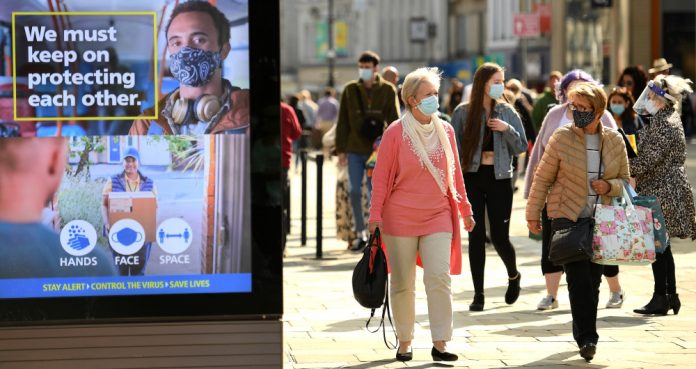LONDON: Retail sales in Britain tumbled and government borrowing soared in January after the country re-entered lockdown over the coronavirus pandemic, official data showed Friday.
Retail sales slumped 8.2 percent last month compared with December, the sharpest fall since April 2020, the Office for National Statistics said in a statement.
“All sectors saw a monthly decline in volume sales … except for non-store retailers and food stores,” the ONS added.
Separate ONS figures showed government net borrowing hit £8.8 billion ($12.2 billion, 10.1 billion euros) in January, a record for the month and the first January deficit for a decade.
Since April 2020, or soon after the UK’s first virus lockdown, public sector net borrowing has ballooned by £270.6 billion.
Overall public sector net debt stands at £2.1 trillion, or around 98 percent of Britain’s total annual economic output.
Finance Minister Rishi Sunak on Friday reiterated the need for Britain to return to ‘a more sustainable footing,’ as he prepares for his annual budget next month.
UK debt has rocketed over the past year, largely as the government pays the bulk of wages for millions of private sector workers.
Sunak said in a statement that investing more than £280 billion to protect jobs, businesses and livelihoods under its furlough scheme “is the fiscally responsible thing to do.”
He added however that “it’s right that once our economy begins to recover, we should look to return the public finances to a more sustainable footing and I’ll always be honest with the British people about how we will do this.”
Britain’s economy shrank by a record 9.9 percent last year but a rapid vaccines rollout has boosted the outlook.
Activity was hampered also by Brexit turmoil ahead of Britain’s final exit from the European Union.
Much of the UK re-entered lockdown in early January to curb a variant Covid-19 strain that was deemed more transmissible.
Sunak is expected to extend a costly wage subsidy program, at least for the hardest-hit sectors, but he said the time for a reckoning would come.
“It’s right that once our economy begins to recover, we should look to return the public finances to a more sustainable footing and I’ll always be honest with the British people about how we will do this,” he said.
Some economists expect higher taxes sooner rather than later.
“Big tax rises eventually will have to be announced, with 2022 likely to be the worst year, so that they will be far from voters’ minds by the time of the next general election in May 2024,” Samuel Tombs, at Pantheon Macroeconomics, said.
Public debt rose to 2.115 trillion pounds, or 97.9 percent of gross domestic product — a percentage not seen since the early 1960s.
The PMI survey and a separate measure of manufacturing from the Confederation of British Industry, showing factory orders suffering the smallest hit in a year, gave Sunak some cause for optimism.
IHS Markit’s chief business economist, Chris Williamson, said the improvement in business expectations suggested the economy was “poised for recovery.”
However the PMI survey showed factory output in February grew at its slowest rate in nine months. Many firms reported extra costs and disruption to supply chains from new post-Brexit barriers to trade with the European Union since Jan. 1.
Separately, dozens of young people lined up recently during heavy rains outside a cramped community hub in London to collect rice, vegetables and other food essentials.
In the line were foreign students who came to Britain to
pursue their dreams of higher education, but have found themselves plunged into pandemic-driven poverty.

UK retail sales fall by most on record as coronavirus lockdown hitsUK retail sales surge past pre-COVID peak in July

